Are you ready to discover the incredible opportunities that lie within African agriculture? Get ready to explore the vibrant world of the 15 most profitable crops to grow in Africa.
From the fertile lands of the continent, these crops have emerged as key drivers of economic growth, transforming the lives of farmers like you.
Experience the allure of crops such as cocoa, coffee, cashews, and maize, which have captured global markets with their exceptional quality and high demand.
Embark on a journey through the diverse landscapes of Africa, where the cultivation of these profitable crops brings prosperity, sustainability, and a brighter future for small-scale farmers.
15 Most Profitable Crops To Grow In Africa
While the profitability of crops can vary based on factors such as region, market demand, and farming practices, here are 15 crops that are often considered profitable to grow in Africa:
- Cocoa
- Coffee
- Cashew
- Maize (Corn)
- Cassava
- Tea
- Cotton
- Palm oil
- Sorghum
- Shea nuts
- Sesame
- Bananas
- Mangoes
- Pineapples
- Avocados
#1. Cocoa
Cocoa, often referred to as the “food of the gods,” is a highly profitable crop grown in several African countries, including Ivory Coast, Ghana, and Nigeria.
African cocoa is renowned for its rich flavor and high quality, making it in high demand worldwide for chocolate production.
With favorable climatic conditions and a strong market, cocoa cultivation provides significant economic opportunities for African farmers.
#2. Coffee
Coffee is a lucrative crop grown in several regions of Africa, including Ethiopia, Uganda, and Kenya.
African coffee is celebrated for its distinct flavors and aromas, commanding a premium price in the global market.
With increasing demand for specialty and organic coffee, African coffee farmers have the potential to earn substantial profits and contribute to the continent’s economic growth.
#3. Cashew
Cashew cultivation is a profitable venture in many African countries, such as Nigeria, Tanzania, and Mozambique.
African cashews are known for their size, flavor, and nutritional value, making them sought after in the international market.
The growing demand for cashews as a healthy snack and ingredient in various food products presents a lucrative opportunity for African farmers to generate income and foster rural development.
#4. Maize (Corn)
Maize, or corn, is a staple crop in Africa and offers profitable opportunities for farmers.
It is widely cultivated across the continent, with countries like Nigeria, South Africa, and Tanzania leading in production.
Maize is used for human consumption, animal feed, and industrial purposes, ensuring a stable market demand and potential for significant profits.
#5. Cassava
Cassava is a versatile and highly profitable crop grown in various African countries, including Nigeria, Ghana, and Uganda.
It is a staple food for millions of people and has diverse uses, including being processed into flour, starch, and animal feed.
The robust nature of cassava plants, combined with high market demand, makes cassava cultivation a lucrative option for small-scale farmers in Africa.
#6. Tea
Tea cultivation presents a profitable opportunity in Africa, with its distinct flavors and global popularity.
The continent boasts ideal conditions for tea production, making it a lucrative crop for farmers.
The demand for high-quality African tea continues to rise, creating a favorable market for growers and contributing to the economic growth of tea-producing regions.
#7. Cotton
Cotton is a cash crop that holds significant economic importance in Africa. The continent has favorable agroclimatic conditions for cotton cultivation, leading to high-quality fiber production.
With a strong demand for cotton in both domestic and international markets, African farmers can tap into this profitable crop and enhance their income while contributing to the textile industry.
#8. Palm oil
Palm oil cultivation has gained prominence in Africa due to its versatility and wide range of applications.
With the continent’s suitable climate and abundant land, palm oil production has become a profitable venture.
The demand for palm oil, used in various industries such as food, cosmetics, and biofuel, ensures a stable market, making it an attractive crop for African farmers.
#9. Sorghum
Sorghum, a versatile cereal grain, offers profitable opportunities for farmers in Africa. Its resilience to harsh climatic conditions and ability to thrive in semi-arid regions make it a valuable crop.
Sorghum is widely used in food and beverage industries, providing a consistent demand and income source for farmers, particularly in regions with limited water resources.
#10. Shea nuts
Shea nuts, native to Africa, are highly sought after for their rich oil content and versatile applications in the cosmetic and food industries.
Growing shea nuts can be profitable for farmers, especially in West Africa where shea trees are abundant.
The increasing global demand for shea butter and related products presents an opportunity for African farmers to capitalize on this high-value crop.
#11. Sesame
Sesame cultivation presents a profitable opportunity for African farmers. The demand for sesame seeds continues to grow due to their versatile use in culinary and oil production industries.
With suitable agroclimatic conditions in various regions of Africa, farmers can capitalize on the profitability of sesame and meet the rising global demand.
#12. Bananas
Bananas are a highly profitable crop in Africa, with both domestic and international markets seeking the delicious and nutritious fruit.
African countries are known for their high-quality bananas, making them competitive in the global market.
Bananas offer a consistent income stream for farmers and contribute to food security and nutrition in local communities.
#13. Mangoes
Mango cultivation is a lucrative venture in Africa, thanks to the continent’s ideal climate for growing this tropical fruit.
Mangoes have a high demand, both fresh and processed, in local and international markets.
African farmers can capitalize on this opportunity by cultivating high-quality mangoes and accessing profitable export markets.
#14. Pineapples
Pineapple production is a profitable venture in Africa, with the continent offering favorable conditions for this tropical fruit.
The sweet and tangy pineapples have a strong market demand, both locally and internationally.
African farmers can benefit from the profitability of pineapple cultivation, contributing to economic growth and creating employment opportunities.
#15. Avocados
Avocado cultivation has gained significant momentum in Africa, driven by increasing global demand for this nutritious and versatile fruit.
The continent’s diverse agroclimatic zones provide ideal conditions for growing avocados throughout the year.
With favorable market prices and growing consumer interest, avocados offer a profitable opportunity for African farmers.
Cultivation Techniques of Profitable Crops for Small Farms in Ghana
- Crop Selection: Choose crops that are suitable for the local climate and market demand.
- Land Preparation: Ensure proper soil cultivation, including plowing, leveling, and weed control.
- Seed Selection: Use high-quality seeds from reliable sources to ensure good germination and yield.
- Irrigation Management: Implement efficient irrigation techniques to optimize water usage and crop growth.
- Pest and Disease Control: Regularly monitor crops for pests and diseases, and employ integrated pest management practices.
- Fertilizer Application: Apply fertilizers based on soil nutrient analysis to provide adequate nutrition to the crops.
- Crop Rotation: Practice crop rotation to prevent soil depletion and manage pest and disease pressure.
- Harvesting and Post-Harvest Handling: Adopt proper harvesting techniques and ensure timely post-harvest handling to maintain crop quality.
Best Practices for Profitable Crops for Small Farms in Ghana
- Market Research: Conduct thorough market research to identify profitable crop options and understand consumer preferences.
- Farm Planning: Develop a comprehensive farm plan, considering crop rotation, diversification, and intercropping.
- Efficient Resource Management: Optimize the use of land, water, and inputs to maximize productivity and minimize costs.
- Continuous Learning: Stay updated on the latest farming practices, technologies, and innovations through training and networking.
- Access to Credit and Inputs: Establish partnerships with financial institutions and suppliers to access credit and quality inputs.
- Collaboration and Cooperatives: Join farmer cooperatives to benefit from collective bargaining power, shared resources, and market access.
- Record-Keeping: Maintain detailed records of farm activities, expenses, and yields to track profitability and make informed decisions.
Risk Management Strategies for Profitable Crops for Small Farms in Ghana
- Diversification: Cultivate a variety of crops to spread risks associated with market fluctuations and crop-specific challenges.
- Insurance Coverage: Explore crop insurance options to mitigate losses due to natural disasters, pests, or diseases.
- Climate-Smart Farming: Implement climate-resilient practices such as water conservation, soil conservation, and agroforestry.
- Early Warning Systems: Stay informed about weather forecasts, pest outbreaks, and market trends to make proactive decisions.
- Savings and Emergency Funds: Build financial reserves to handle unexpected expenses or income fluctuations.
- Collaboration and Networking: Engage with local farmers, extension services, and agricultural organizations to share knowledge and support each other during challenging times.
Market Demand of Profitable Crops for Small Farms in Ghana
Market demand for profitable crops in Ghana is influenced by several factors:
- Domestic Consumption: Consider the local demand for staple crops like maize, cassava, and plantains, which form the core of Ghanaian diets.
- Export Opportunities: Identify crops with high export potential, such as cocoa, coffee, cashew, and shea nuts, which have a strong demand in international markets.
- Value-Added Products: Explore opportunities to process crops into value-added products like processed foods, beverages, oils, or cosmetic ingredients, targeting both domestic and export markets.
- Consumer Preferences: Stay attuned to changing consumer preferences for healthy and organic products, which can drive demand for crops like organic fruits, vegetables, and herbs.
- Market Research: Conduct market surveys, engage with buyers, and assess market trends to align crop production with current and emerging demands.
Factors for Successful Planting of Profitable Crops for Small Farms in Ghana
- Agroclimatic Conditions: Understand the specific requirements of each crop and choose those that thrive in the local climate and soil conditions.
- Access to Quality Inputs: Ensure availability of certified seeds, fertilizers, and pesticides from reliable sources to achieve optimal yields.
- Farm Management Skills: Acquire knowledge on crop-specific cultivation techniques, pest and disease management, and efficient resource utilization.
- Irrigation and Water Management: Develop strategies for water availability, including rainwater harvesting and efficient irrigation methods.
- Access to Market: Establish market linkages and networks to ensure a ready market for the crops produced.
- Collaboration and Knowledge Sharing: Engage with local agricultural extension services, farmers’ groups, and organizations to exchange knowledge and learn best practices.
- Farm Size and Scale: Consider the size of the farm and available resources when selecting crops, ensuring they are suitable for small-scale cultivation.
Economic Significance of these Profitable Crops for Small Farms in Ghana
The cultivation of profitable crops on small farms in Ghana holds significant economic importance:
- Income Generation: Profitable crops provide a reliable income source for small-scale farmers, improving their livelihoods and contributing to poverty reduction.
- Employment Opportunities: Crop cultivation creates employment opportunities along the value chain, from farm labor to processing, distribution, and marketing.
- Foreign Exchange Earnings: Crops with export potential, such as cocoa, coffee, cashew, and shea nuts, generate foreign exchange earnings, contributing to Ghana’s economy.
- Rural Development: Profitable crop farming promotes rural development by stimulating economic activities, infrastructure development, and social well-being in rural communities.
- Food Security and Nutrition: Crop cultivation ensures food security and improves nutrition by producing staple crops like maize, cassava, and plantains, which are essential components of the Ghanaian diet.
- Value Addition and Agribusiness: Profitable crops create opportunities for value addition and agribusiness development, leading to the establishment of processing industries, job creation, and higher value for agricultural products.
Vegetables In High Demand In Ghana
- Tomatoes
- Onions
- Bell peppers
- Lettuce
- Cabbage
- Carrots
- Eggplant
- Green beans
- Okra
- Spinach
Best Crop To Grow On 5 Acres
The best crop to grow on 5 acres depends on various factors such as market demand, local climate, and personal preferences. However, some profitable crops for small-scale farming on 5 acres include:
- Maize (corn)
- Soybeans
- Cassava
- Watermelon
- Sweet potatoes
Best Crops For Beginning Farmers
Beginning farmers can start with crops that are relatively easy to cultivate and have a steady market demand. Some suitable crops for beginning farmers include:
- Tomatoes
- Cucumbers
- Green beans
- Lettuce
- Radishes
- Basil
- Spinach
- Peppers
- Carrots
- Onions
High-value Crops
High-value crops are those that fetch a premium price in the market due to their quality, demand, and unique characteristics. Some high-value crops include:
- Herbs and spices (such as saffron, vanilla, and cinnamon)
- Medicinal plants (such as ginseng and aloe vera)
- Specialty fruits (such as berries and tropical fruits)
- Exotic vegetables (such as microgreens and heirloom varieties)
- Specialty nuts (such as almonds and macadamia nuts)
Best Cash Crop For 1 Acre
While the best cash crop for 1 acre can vary depending on the specific location and market conditions, some potential cash crops for small-scale farming on 1 acre include:
- Basil
- Salad greens (such as lettuce and kale)
- Strawberries
- Specialty herbs (such as mint and cilantro)
- Cherry tomatoes
The Most Profitable Farming
The profitability of farming depends on various factors such as crop selection, market demand, input costs, and efficiency of operations. Some farming sectors known for their profitability include:
- Cash crop farming (such as cocoa, coffee, and tea)
- Organic farming (producing organic fruits, vegetables, and herbs)
- Aquaculture (fish farming)
- Poultry farming (especially broiler chicken production)
- Floriculture (cultivating flowers for commercial purposes)
How to Start Farming in Ghana
To start farming in Ghana, consider the following steps:
- Research and planning: Identify the type of farming you want to pursue and conduct thorough research on market demand, suitable crops, and farming techniques.
- Land acquisition: Acquire or lease suitable farmland based on your farming requirements.
- Farm infrastructure: Develop essential infrastructure such as fencing, water sources, and storage facilities.
- Obtain necessary permits and licenses: Register your farm and comply with legal requirements.
- Secure financing: Seek financial support through loans, grants, or savings to cover startup costs and operational expenses.
- Crop selection and cultivation: Choose crops suitable for your farm’s location and market demand, and implement appropriate cultivation techniques.
- Market access: Establish links with local markets, distributors, or retailers to ensure a ready market for your produce.
- Continuous learning: Stay updated on farming practices, attend training programs, and engage with agricultural extension services for knowledge and support.
Richest Farmer in Ghana
As of my knowledge cutoff in September 2021, the richest farmer in Ghana is believed to be Charles Gyamfi, a successful cocoa farmer and entrepreneur.
However, it’s important to note that financial statuses can change over time, and there may be other individuals who have achieved significant success in agriculture since then.
Conclusion
The 15 most profitable crops to grow in Africa symbolize the boundless potential and economic significance of the continent’s agriculture. These crops, with their market demand, exceptional quality, and global reach, empower African farmers to thrive, contribute to food security, and shape a prosperous future for Africa’s agricultural landscape.



